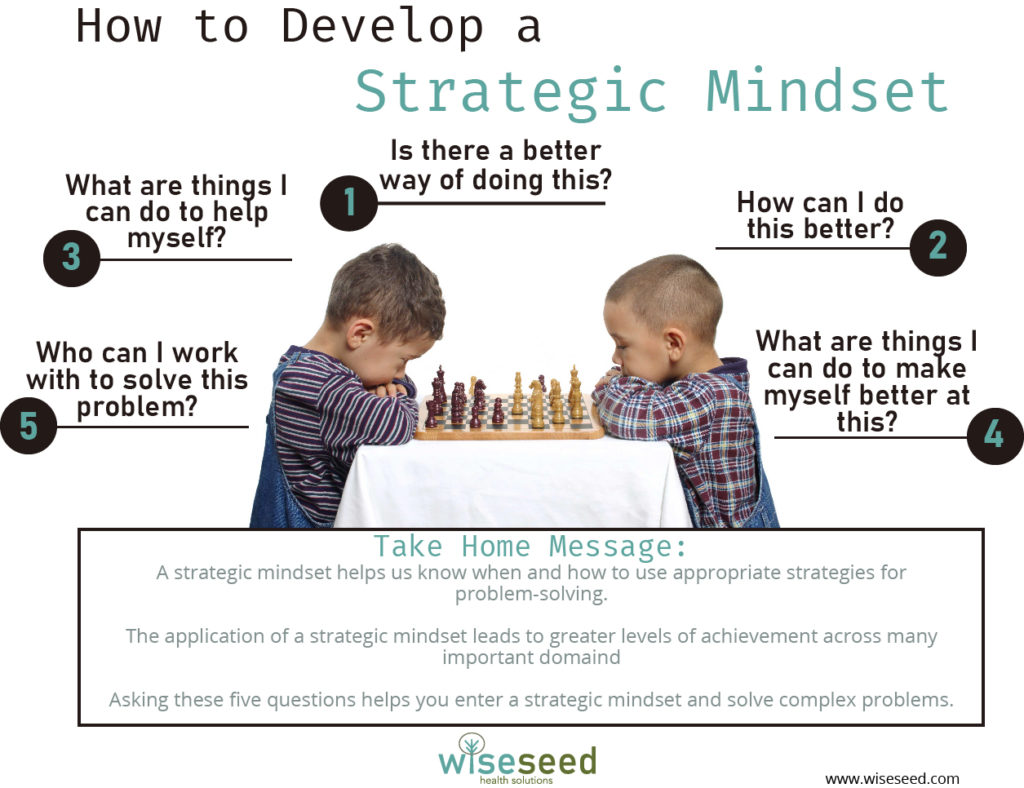How to Build a Strategic Mindset

Change: The Challenge of Modern Living
Resilient humans are effective humans. They get things done. However, the challenge of the 21st Century is that the modern world is changing at a frightening pace. As a result, it’s becoming harder and harder just to keep up, let alone get ahead!
And yet, we’ve all seen those ‘lucky’ individuals who always seem to have their act together. While the rest of us struggle with setbacks, failure, and plain bad luck, they relentlessly move forward, making life seem so effortless. What’s with those folks?
The Power of Metacognition
One thing that separates the movers of the world from the rest of us is their strategic approach to life. That’s why we developed the S.P.A.R methodology, which provides a simple framework to help you adapt and thriving in times of rapid change.
Approaches such as S.P.A.R that involve goal selection, planning, self-monitoring and adaptation are referred to as metacognitive strategies. Metacognition is a fancy word used in psychology that means ‘thinking about thinking’ and ‘knowing about knowing’ 1. However, for today’s article, we refer to metacognition simply as knowing when and how to use appropriate strategies for problem-solving 1.
It’s well known that the application of metacognitive strategies leads to greater levels of achievement across important domains of life, including academia 2, health and fitness 3, as well as career and personal goals 4. What isn’t known is why some people are better at implementing metacognitive strategies than others, and whether this is a skill that can be taught and consciously improved 5.
Fortunately for us, researchers at Stanford have answered these questions. They recently identified what they call the strategic mindset 5, and they’ve developed ways to help you activate a strategic mindset whenever you encounter a new challenge or face a long-standing obstacle 5.
What the researchers found
The Stanford group proposed that people who have a strategic mindset are more likely to develop and apply metacognitive strategies when confronted with difficult problems. Simply put, people with a strategic mindset are highly skilled at accessing and implementing useful life strategies.
The researchers performed three separate studies linking a strategic mindset to goal achievement. Their first study found that students who had a strategic mindset were better at developing strategies to optimise their approach to learning, which in turn improved their academic grades 5.
In the second study, the researchers found that adults with a strategic mindset developed effective metacognitive strategies, which increased their likelihood of achieving key career and health goals 5.
The third, and most compelling study of all, the researchers triggered a strategic mindset in people, which allowed them to perform better at a novel problem in the lab 5.
Collectively, these studiess support three important conclusions. First, a strategic mindset allows you to access metacognitive strategies. Second, the application of metacognitive strategies helps you achieve your life goals across a range of settings, including academic, professional, and health. Finally, and most importantly, they indicate that a strategic mindset can be purposefully induced when you need it most.
How do you develop a strategic mindset?
When you are confronted by an especially difficult challenge, you can consciously activate your strategic mindset by asking yourself the following five questions.
1. “Is there a better way of doing this?”
2. “How can I do this better?”
3. “What are things I can do to help myself?”
4. “What are things I can do to make myself better at this?”
5. “Who can I work with to solve this problem?”
These five simple questions are an invitation to unleash your inner creativity and problem-solving abilities. However, to get the most out of this approach, you must work hard at answering these questions with truth and rigor.
It’s important to note that developing a strategic mindset isn’t necessarily a solitary process, although it can be. In fact, the purpose of question five is to give yourself permission to seek outside help. This could be in the form of a mentor, a teacher, or even a paid contractor. And remember that solutions are not necessarily short-term. You will discover that significant time is required to learn a new skill is necessary to achieve one or more long-term goals.
A strategic mindset is not a stand-alone solution
A strategic mindset alone is insufficient for achieving goals.
For example, if you don’t know any useful strategies, then a strategic mindset won’t be of much help. This is why becoming a lifelong learner is so important, because it gives you the opportunity to learn many strategies for effective problem solving.
Further, overcoming difficult challenges often requires extreme physical and mental effort. Therefore, you need to spend time developing your grit and physical fortitude. And your solution may require the help of others, which is why you should develop your social network and your community.
The point is, while it’s true that developing a strategic mindset will help you achieve your goals, you still need the other everyday resilience domains for a strategic mindset to work. Each domain supports the other.
Conclusion
An essential part of living a good life is achieving your life goals. Cultivating a strategic mindset will help you achieve these goals, as well as overcome unexpected challenges along the way.
Please click on the link below for your free PDF of the article.

References and Further Reading
1 Metcalfe, J. & Shimamura, A. P. Metacognition: Knowing about knowing. (MIT press, 1994).
2 Chen, P., Chavez, O., Ong, D. C. & Gunderson, B. Strategic Resource Use for Learning: A Self-Administered Intervention That Guides Self-Reflection on Effective Resource Use Enhances Academic Performance. Psychol Sci 28, 774-785, doi:10.1177/0956797617696456 (2017).
3 Johannessen, K. B., Oettingen, G. & Mayer, D. Mental contrasting of a dieting wish improves self-reported health behaviour. Psychol Health 27 Suppl 2, 43-58, doi:10.1080/08870446.2011.626038 (2012).
4 Gollwitzer, P. M. & Brandstätter, V. Implementation intentions and effective goal pursuit. Journal of personality and social psychology 73, 186 (1997).
5 Chen, P., Powers, J. T., Katragadda, K. R., Cohen, G. L. & Dweck, C. S. A strategic mindset: An orientation toward strategic behavior during goal pursuit. Proc Natl Acad Sci U S A 117, 14066-14072, doi:10.1073/pnas.2002529117 (2020).
Disclaimer
The material displayed on this website is provided without any guarantees, conditions or warranties as to its accuracy.
Information written and expressed on this website is for education purposes and interest only. It is not intended to replace advice from your medical or healthcare professional.
You are encouraged to make your own health care choices based on your own research and in conjunction with your qualified practitioner.
The information provided on this website is not intended to provide a diagnosis, treatment or cure for any diseases. You should seek medical attention before undertaking any diet, exercise, other health program or other procedure described on this website. To the fullest extent permitted by law we hereby expressly exclude all warranties and other terms which might otherwise be implied by statute, common law or the law of equity and must not be liable for any damages whatsoever, including but without limitation to any direct, indirect, special, consequential, punitive or incidental damages, or damages for loss of use, profits, data or other intangibles, damage to goodwill or reputation, injury or death, or the cost of procurement of substitute goods and services, arising out of or related to the use, inability to use, performance or failures of this website or any linked sites and any materials or information posted on those sites, irrespective of whether such damages were foreseeable or arise in contract, tort, equity, restitution, by statute, at common law or otherwise.

Ten Minutes is All You Need
Research has shown that ten minutes of moderate-to-vigorous exercise performed each day is enough to significantly reduce your risk of early death.

The Role of Probiotics in Cancer Therapy
New bacterial therapies can improve the survival of patients with difficult-to-treat cancers, such as metastatic melanoma.




